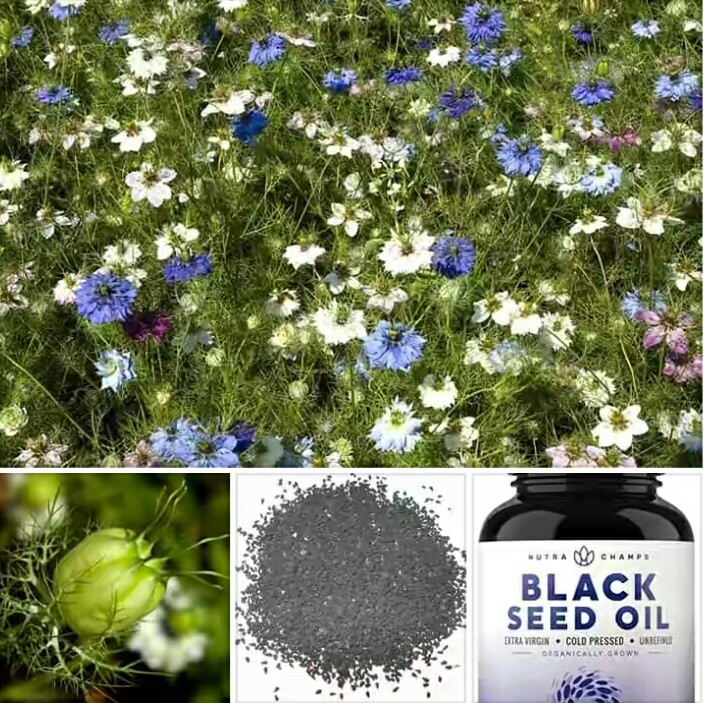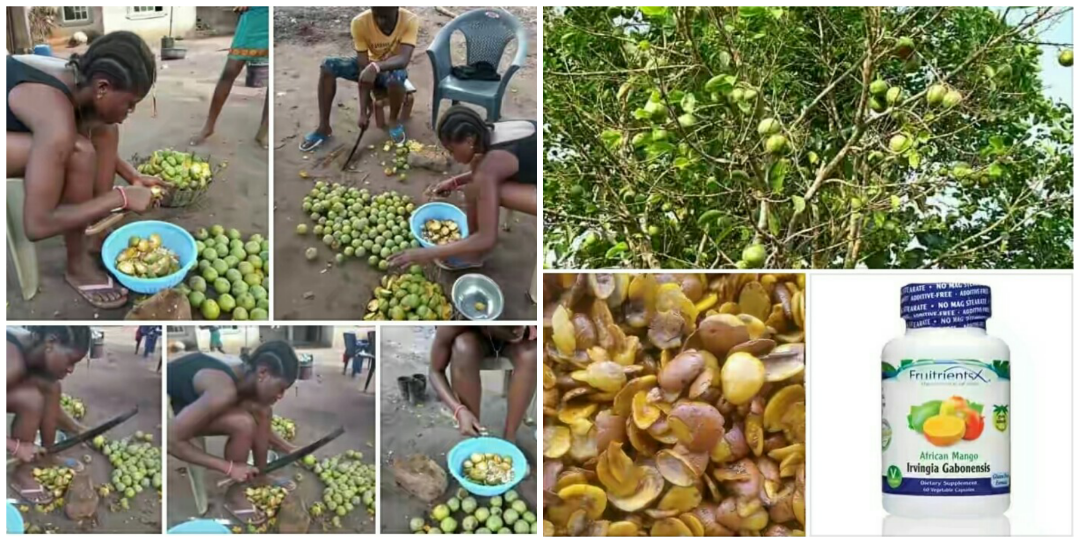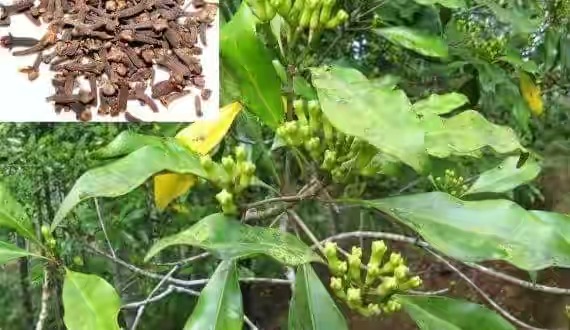Nigella sativa; synonyms: Nigella truncata, Nigella indica, Nigella cretica (Botanical Scientific name) or Black Caraway, Black cumin, Black onion seed, Black seed, Fennel flower, Gith, Kalonji, Love-in-a-mist, Nigella, Nutmeg flower, Nutmeg plant, Onion seed, Ragged lady, Roman coriander, Small fennel (English) or Habatu sauda (Hausa) or Asofeyeje (Yoruba): A plant with seeds used in different civilization around the world for centuries to treat various animal and human illnesses
DESCRIPTION AND OCCURRENCE:
Nigella sativa L. (N. sativa) is a small shrub (20-90 cm in tall) under the botanical family, Ranunculaceae. The leaves are compound (made up of two or more discrete leaflets. Leaves alternate (there is one leaf per node along the stem). The edge of the leaf blade is entire (has no teeth or lobes).
It has tapering green leaves and rosaceous white, yeallow, pink, pale blue or purplish flowers. Flower symmetry: there are two or more ways to evenly divide the flower (the flower is radially symmetrical). Number of sepals, petals or tepals: there are five petals, sepals, or tepals in the flower. Fusion of sepals and petals both the petals and sepals are separate and not fused. Stamen number: 13 or more; fruit type (general): the fruit is dry and splits open when ripe with of up to 1.2 mm. The ripe fruit (capsule: 3-7 united follicles) contains numerous tiny seeds, dark black in color.
Nigella sativa is probably indigenous to the Mediterranean region and the Middle East up to India. Black cumin has long been cultivated and is mentioned in ancient Hebrew, Greek and Roman texts. It is cultivated in the subtropical belt extending from Morocco to northern India and Bangladesh, in East Africa and in the former Soviet Union. In Europe, North America and South-East Asia it is cultivated on a minor scale, mainly for medicinal purposes.
USES/IMPORTANCE/HEALTH BENEFITS
Among several medicinal plants, Habatu sauda has been considered one of the most treasured nutrient-rich herb in history around the world and numerous scientific studies are in progress to validate the traditionally claimed uses of small seed of this species.
The nutritional composition reported from different sources revealed 20-85% of protein, 38.20% of fat (26-34% fixed oil of which the major fatty acids are linoleic acid (64.6%) and palmitic acid (20.4%))), 7-94% of fiber, and 31.94% of total carbohydrates.
Among various amino acids identified, glutamate, arginine, and aspartate while cysteine and methionine were the major and minor amino acids in descending order. Black cumin seeds also contain significant levels of iron, copper, zinc, phosphorus, calcium, thiamin, niacin, pyridoxine, and folate.
Phytochemical analyses of N. sativa has revealed the presence of over hundreds of phytoconstituents, which include mainly alkaloids, saponins, sterols, and essential oil but the composition of many of these have not been chemically recognized nor have been biologically verified. Nigella sativa has been widely used as a spice and flavoring agent in variety of food preparations such as in bread, yogurt, pickles, sauces, and salads.
Black seed or black cumin (English), Habbatul Barakah (Arabic), Tikur azmud (Amharic), has long been used in traditional remedy in the Arabian countries, Far East Asia, Europe, and Africa. Nigella sativa has also been described as the miraculous plant and considered by earliest herbal specialists as “The herb from heaven”. The Prophet Mohammed (PBUH) had described the curative powers of the black seed as “Hold on to use this black seed, as it has a remedy for every illness except death”.
Avicenna, a well-known physician of 10th century famous for his book “The Canon of Medicine,” has recommended use of Nigella seeds for enhancement of body’s energy and also support during recovery from fatigue and dispiritedness.
Nigella sativa is also mentioned for its curative property in the Holy Bible and is also labelled as Melanthion by Hippocrates and Dioscorides. These small black seeds historically have been used in food and cooking preparations and for more than 2,000 years as a folk medicine to treat ailments ranging from headaches to parasitic infections. Reports suggest Nigella sativa was discovered in King Tut’s tomb.
Today, Nigella sativa supplements are available online and in health food stores under the name black seed and usually are sold in capsules of crushed black seed or softgels of black seed oil. The supplements are marketed to support overall health and well-being and to treat specific ailments such as asthma, allergies, flu, joint pain, and gastrointestinal problems.
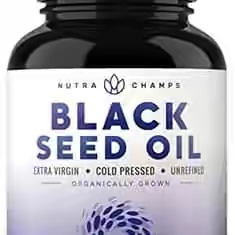
On the heels of much animal research, published results from human studies have emerged exploring Nigella sativa’s role as an effective complementary and alternative medicine. For example, Nigella sativa has demonstrated antioxidant, hypotensive, calcium channel blockade, and diuretic effects that function to lower blood pressure.
Its vasorelaxant effect was demonstrated in a double-blind, randomized, placebo-controlled clinical trial of 70 healthy individuals between the ages of 34 and 63 with systolic blood pressure ranging from 110 to 140 mm Hg and diastolic blood pressure from 60 to 90 mm Hg (The American Heart Association defines the optimal range for blood pressure as below 120/80 mm Hg). Published in the December 2013 issue of Phytotherapy Research, the results suggested that an oral intake of 5 ml of Nigella sativa oil for eight weeks significantly lowered systolic and diastolic blood pressures without any apparent adverse effects. When taken as an oral supplement, Nigella sativa has shown potential in improving dyslipidemia.
Results of a four-week clinical trial suggested that supplemental Nigella sativa lowered total cholesterol by 5%, LDL cholesterol by 8%, and triglyceride levels by 17%.A two-month randomized trial of menopausal women with hyperlipidemia, published in the Journal of Translational Medicine, associated the intake of a Nigella sativa supplement with a 27% reduction in LDL cholesterol, a 22% decrease in triglycerides, and a 16% decline in total cholesterol. Researchers noted a slight but statistically insignificant improvement in HDL cholesterol levels.
Furthermore, the researchers observed that when the women stopped taking the supplement, their lipid profiles reverted to pretreatment levels. One theory behind the slight HDL-boosting effects of Nigella sativa is that it stimulates apolipoprotein A-I gene expression, which is the primary component of cardioprotective HDL cholesterol.
An analysis of overweight sedentary women published in the International Journal of Preventive Medicine showed that eight weeks of Nigella sativa supplementation combined with aerobic activity had a synergistic effect in improving serum lipid profiles. Researchers saw a 5% decrease in total cholesterol, an 8% reduction in triglycerides, a 5% drop in LDL cholesterol, and a 6% rise in HDL cholesterol.
In a 12-week study published in the Journal of Family Community Medicine, researchers compared the effects of three different doses of Nigella sativa supplements (1, 2, and 3 g/day) on the lipid profiles of 94 individuals with type 2 diabetes. Patients who took 2 g/day had significantly greater reductions in total cholesterol (up to 15%), LDL cholesterol (up to 17%), triglycerides (up to 22%) and increases in HDL cholesterol (up to 6%) compared with those who took 1 g/day.
However, researchers didn’t see a significantly greater benefit in those who took 3 g/day. The improvement in lipid profile caused by the ingestion of Nigella sativa could be attributed to the presence of phytosterols in this plant.
Phytosterols are important part of human diet and are gaining greater interest due to their nutraceutical and medicinal benefits in lowering low density lipoprotein and total cholesterol level. The total sterols content of black cumin seed oil as estimated by different researchers was found to be between 18 and 42% of the unsaponified matter.
The major sterols identified were β-sitosterol, campesterol, stigmasterol, and 5-avenasterol. Researchers who have studied Nigella sativa in vitro have found that thymoquinone, the predominant bioactive constituent in this plant, can induce apoptosis (programmed cell death) and slow cancer cell metastasis (spreading) in breast cancer, glioblastoma, melanoma, squamous cell carcinoma, certain forms of lymphoma, cervical cancer, osteosarcoma, and lymphoblastic leukemia.
Thymoquinone analogs have been shown to inhibit pancreatic cancer cell proliferation in vitro and enhance cancer cell sensitivity to chemotherapy and results of a recent in vitro study showed that Nigella sativa seed extract and seed oil significantly reduced human lung cancer cell viability.
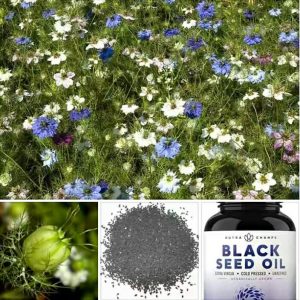
Because these are in vitro studies, more research is needed to determine the anticancer effects in vivo. One study suggested oral Nigella sativa supplementation could improve blood glucose control among in patients with type 2 diabetes. Results of a recent animal study suggested that Nigella sativa supplements can help lower blood glucose levels and improve serum lipid profiles, demonstrating its potential as a functional food to treat diabetes and its associated comorbidities.
In addition, researchers investigated the hypoglycemic effects of Nigella sativa in a study of menopausal women. They reported that 1 g/day of encapsulated Nigella sativa seed powder taken for two months correlated with a significant decrease in fasting blood glucose levels and improvement in serum lipid profiles compared with placebo.
Following animal studies demonstrating a possible link between Nigella sativa and improved brain function, human studies are further establishing this relationship. A study of 40 healthy elderly patients showed that 1 g/day of Nigella sativa enhanced memory, cognition, and attention without adverse side effects. Based on these findings, the researchers emphasized the need for further research in Nigella sativa’s role in preventing or slowing the progression of Alzheimer’s disease.
A study published in the World Journal of Gastroenterology found a link between hepatoprotection (liver protection) and Nigella sativa in individuals with hepatitis C. Researchers concluded that 1,350 mg/day of Nigella sativa was tolerable, safe, and decreased viral load among participants. Moreover, this dose was found to improve oxidative stress, clinical condition, and glycemic control among diabetes patients with hepatitis C.
The beneficial, immune-modulating effects of Nigella sativa were demonstrated in a recent study on individuals suffering from rheumatoid arthritis. 500-mg dose of Nigella sativa oil capsules twice daily was associated with a decrease in disease activity and symptoms of swollen joints and morning stiffness, suggesting Nigella sativa may be an affordable potential adjuvant therapy for rheumatoid arthritis treatment. A prospective, double-blind, placebo-controlled trial investigated the anti-inflammatory effects of Nigella sativa on patients with allergic rhinitis.
The results suggested it may reduce common symptoms such as nasal itching and congestion, runny nose, and sneezing. The researchers noted that this supplement could be considered a treatment for allergic rhinitis when the side effects of common allergy drugs must be avoided.
N. sativa is reported to have strong ANTIBACTERIAL ACTIVITY against gram positive (Staphylococcus aureus) and gram negative (Pseudomonas aeruginosa & Escherichia coli) species.
It shows synergistic effects with streptomycin and gentamycin, while additive with spectinomycin, erythromycin, tobramycin, doxycycline, chloramphenicol, nalidixic acid, ampicillin, lincomycin and co-trimoxazole and similar to topical mupirocin.
It can fight against resistant microorganisms, including against many multi-drug-resistant gram positive and gram negative bacteria. N. sativa was shown to enhance helper-T-cell (T4) and suppressor-T-cell (T8) ratio and increased natural killer (NK) cell activity in human.
Otherwise, it is proven as a good inhibitor to the human immunodeficiency virus (HIV) protease and murine cytomegalovirus. In the latter case, it was found to increase in number and function of M-phi and CD4+ve T cells with the production of interferon-gamma (INF-γ) was reported. N. sativa was shown to have anti-leishmaniasis, anti-miracidia, anti-cercariae and anti-Schistosoma mansoni potentials.
In the latter case the oil of the black seed showed strong activity as compared to a well-known anti-schistosomal and anthelmintic drug for domestic animals, prazequantel; where it produced a potentiating effect with co-treatment.
SIDE EFFECTS OF BLACK SEED OIL
very rare. Though some people may complain of allergy (itching), stomach upset, vomitting,nausea. Black seed oil worsens seizures, so persons with seizure disorder (epileptics) should NOT use it.
Worthy of note is the reported case of a 62 year old diabetic woman who developed kidney failure after taking 2-2.5g daily dose of black seed oil capsule. This is the only reported and documented case in medical history. Persons with diabetes or kidney problems should take black seed oil with extreme caution or better avoid it.. to be on a safe side. At best, diabetics or kidney disease patients should take very low dose.
MAJOR REFERENCES
1. Ahmad I, Muneer KM, Tamimi IA, Chang ME, Ata MO, Yusuf N. Thymoquinone suppresses metastasis of melanoma cells by inhibition of NLRP3 inflammasome. Toxicol Appl Pharmacol. 2013;270(1):70-76.
2. Bamosa AO, Kaatabi H, Lebdaa FM, Elq AM, Al-Sultanb A. Effect of Nigella sativa seeds on the glycemic control of patients with type 2 diabetes mellitus. Indian J Physiol Pharmacol. 2010; 54(4):344-354.
3. Barakat EM, El Wakeel LM, Hagag RS. Effects of Nigella sativa on outcome of hepatitis C in Egypt. World J Gastroenterol. 2013;19(16):2529-2536.Bin Sayeed MS, Asaduzzaman M, Morshed H, Hossain MM, Kadir MF, Rahman MR. The effect of Nigella sativa Linn. seed on memory, attention and cognition in healthy human volunteers. J Ethnopharmacol. 2013;148(3):780-786.
4. Fallah Huseini H, Amini M, Mohtashami R, et al. Blood pressure lowering effect of Nigella sativa L. seed oil in healthy volunteers: a randomized, double-blind, placebo-controlled clinical trial. Phytother Res. 2013; 27(12):1849-1853.
5. Gheita TA, Kenawy SA. Effectiveness of Nigella sativa oil in the management of rheumatoid arthritis patients: a placebo controlled study. Phytother Res. 2012;26(8):1246-1248.Haas MJ, Onstead-Haas LM,
6. Naem E, Wong NC, Mooradian AD. Induction of apolipoprotein A-I gene expression by black seed (Nigella sativa) extracts [published online March 17, 2014]. Pharm Biol.
7. Kaatabi H, Bamosa AO, Lebda FM, Al Elq AH, Al-Sultan AI. Favorable impact of Nigella sativa seeds on lipid profile in type 2 diabetic patients. J Family Community Med. 2012; 19(3):155-161.
8. Karna SKL (2013) Phytochemical Screening and Gas Chromatography – Mass Spectrometry and Analysis of Seed Extract of Nigella sativa Linn. Int J Chem Studies 1(4): 183-188.
9. Leong XF, Rais Mustafa M, Jaarin K. Nigella sativa and its protective role in oxidative stress and hypertension. Evid Based Complement Alternat Med. 2013; 2013:120732.
10. Manju S, Malaikozhundan B, Vijayakumar S, Shanthi S, Jaishabanu A, et al. (2016) Antibacterial, antibiofilm and cytotoxic effects of Nigella sativa essential oil coated gold nanoparticles. Microb Pathog 91: 129-135.
11. Nikakhlagh S, Rahim F, Aryani FH, Syahpoush A, Brougerdnya MG, Saki N. Herbal treatment of allergic rhinitis: the use of Nigella sativa. Am J Otolaryngol. 2011; 32(5):402-407.
12. Sabzghabaee AM, Dianatkhah M, Sarrafzadegan N, Asgary S, Ghannadi A. Clinical evaluation of Nigella sativa seeds for the treatment of hyperlipidemia: a randomized, placebo controlled clinical trial. Med Arch. 2012;66(3):198-200.
13. Salim LZ, Mohan S, Othman R, et al. Thymoquinone induces mitochondria-mediated apoptosis in acute lymphoblastic leukaemia in vitro. Molecules. 2013;18(9):11219-11240.
14. Shabana A, El-Menyar A, Asim M, Al-Azzeh H, Al Thani H. Cardiovascular benefits of black cumin (Nigella Sativa). Cardiovasc Toxicol. 2013; 13(1):9-21.
15. Ibrahim RM, Hamdan NS, Mahmud R, et al. A randomised controlled trial on hypolipidemic effects of Nigella Sativa seeds powder in menopausal women. J Transl Med. 2014;12:82.
16. Yusufi M, Banerjee S, Mohammad M, et al. Synthesis, characterization and anti-tumor activity of novel thymoquinone analogs against pancreatic cancer. Bioorg Med Chem Lett. 2013; 3(10):3101-3104.
This article is the intellectual property of:
Sa’eed Halilu Bawa
Senior Lecturer (Associate Professor) at University of the West Indies, St. Augustine Campus, Trinidad.
Studied Food and Nutrition Sciences, Dietetics at Kaduna Polytechnic, Nigeria; Warsaw University of Life Sciences, Poland.

















